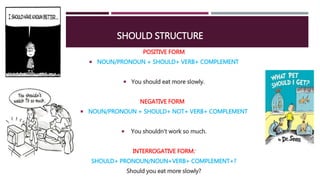Should
- 3. SHOULD  Is most commonly used to make recommendations or give advice.  It can also be used to express obligation as well as expectation.
- 4. SHOULD STRUCTURE POSITIVE FORM  NOUN/PRONOUN + SHOULD+ VERB+ COMPLEMENT  You should eat more slowly. NEGATIVE FORM  NOUN/PRONOUN + SHOULD+ NOT+ VERB+ COMPLEMENT  You shouldn't work so much. INTERROGATIVE FORM: SHOULD+ PRONOUN/NOUN+VERB+ COMPLEMENT+? Should you eat more slowly?
- 5. MUST
- 6. MUST  Is most commonly used to express certainty.  It can also be used to express necessity or strong recommendation.
- 7. MUST STRUCTURE POSITIVE FORM  NOUN/PRONOUN + MUST + VERB+ COMPLEMENT  You must eat more healthy. NEGATIVE FORM  NOUN/PRONOUN + MUST+ NOT+ VERB+ COMPLEMENT  You must not work so much. INTERROGATIVE FORM: MUST+ PRONOUN/NOUN+VERB+ COMPLEMENT+? Must you take the medicines? •Must I help in the garden?
- 9. DIFFERENCES BETWEEN SHOULD & MUST SHOULD  Should expresses advisability, a suggestion.  It is weaker than must. MUST  We use must to express a stronger point of view.  Also expresses opinion, one person's point of view.
- 10. SHOULD SHOULD PLAIN FORM VERB People should protect the environment. It makes good sense. We should select cars so that they are more fuel-efficient. We should use re-usable bags when shopping. MUST MUST PLAIN FORM VERB We must protect our environment, or our resources will disappear. Engineers must redesign engines so that they are more fuel-efficient. Stores must give out recyclable plastic bags.












